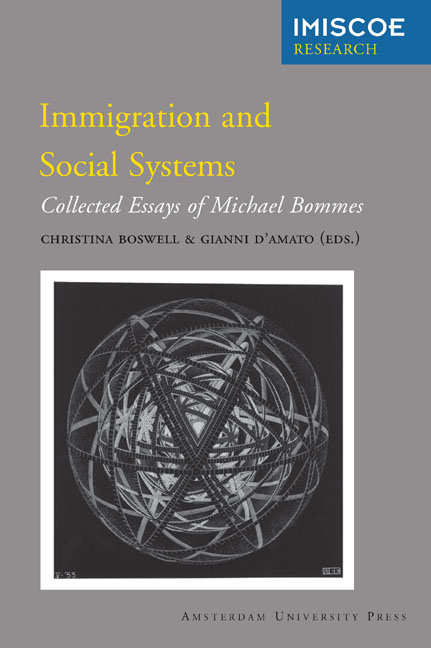Book contents
- Frontmatter
- Contents
- Foreword
- Preface
- Introduction
- 1 Migration in Modern Society
- 2 National Welfare State, Biography and Migration: Labour Migrants, Ethnic Germans and the Re-Ascription Of Welfare State Membership
- 3 Systems Theory and the ‘Ethnic Inequality’ of Migrant Workers
- 4 Welfare Systems and Migrant Minorities: The Cultural Dimension of Social Policies and its Discriminatory Potential
- 5 Transnationalism or Assimilation?
- 6 ‘Integration takes Place Locally’: On the Restructuring of Local Integration Policy
- 7 Illegal Migration in Modern Society: Consequences and Problems of National European Migration Policies
- 8 General and Specific Characteristics of Networks: (with Veronika Tacke)
- 9 National Paradigms of Migration Research: (with Dietrich Thränhardt)
- References
- Other IMISCOE Titles
1 - Migration in Modern Society
Published online by Cambridge University Press: 09 January 2021
- Frontmatter
- Contents
- Foreword
- Preface
- Introduction
- 1 Migration in Modern Society
- 2 National Welfare State, Biography and Migration: Labour Migrants, Ethnic Germans and the Re-Ascription Of Welfare State Membership
- 3 Systems Theory and the ‘Ethnic Inequality’ of Migrant Workers
- 4 Welfare Systems and Migrant Minorities: The Cultural Dimension of Social Policies and its Discriminatory Potential
- 5 Transnationalism or Assimilation?
- 6 ‘Integration takes Place Locally’: On the Restructuring of Local Integration Policy
- 7 Illegal Migration in Modern Society: Consequences and Problems of National European Migration Policies
- 8 General and Specific Characteristics of Networks: (with Veronika Tacke)
- 9 National Paradigms of Migration Research: (with Dietrich Thränhardt)
- References
- Other IMISCOE Titles
Summary
One of the key claims of mainstream migration research is that it is dealing with significant social structural change which represents an empirical and theoretical challenge for the social sciences. Clearly, migration research focuses its attention on problems of social integration and inequality and on the resulting potential for conflict. It sees such problems as arising from the cultural and social resources of migrants, from their opportunities to participate, especially in labour markets, education systems, political and legal systems of the welfare state, health and care facilities, and also from urban housing conditions and the circumstances and living conditions which these entail for migrants.
It can be noted, however, that the success which migration research has achieved, in politics and also in science policy, is at the same time unable to produce any real scholarly resonance. While warnings about potential social conflict and disintegration do attract attention in the political sphere, and are certainly able to mobilise resources for research, sub-disciplinary and interdisciplinary research in the field of international migration receives little attention either on an intradisciplinary or interdisciplinary level, since its contribution to the general theoretical issues of the respective reference disciplines seems limited.
There is probably a simple reason for this: migration research tends to greatly restrict the frame of reference for its inquiry. It focuses less on the socio-structural prerequisites and consequences of international migration on the various levels of modern society, and more on migrants and their living conditions in those social contexts which are seen as significant, and how these conditions result from the context of integration and the structures of social inequality. The basis for this is a limited concept of the social structure which essentially includes the social relations of distribution and inequality. This limitation will not really become a problem for migration research, however, as long as the implicit normative preference for equality and social integration strikes a chord with its dual audience – political and academic – to which migration research addresses its findings. The double articulation of the terminology as scientific concepts, on the one hand, and as more or less undeniable values on the other reinforces these conceptual foundations and lends them intuitive plausibility.
- Type
- Chapter
- Information
- Immigration and Social SystemsCollected Essays of Michael Bommes, pp. 19 - 36Publisher: Amsterdam University PressPrint publication year: 2013



